Editor’s Note: The following review is of a game still listed as Under Development and may not reflect the final product. It can be purchased now as a paid beta. It is written with the consent of the developers.
Democracy 3 – What We Think:
Politicians have it rough. I know, I know – they’re all a bunch of corrupt blowhards who would sell their own mothers if it would win votes. I’m pretty sure “getting kicked in the genitals” has a higher approval rating than Congress.
But put yourself in their shoes for a minute: The average voter knows little about politics and even less about the realities of government. Everyone wants freedom and low taxes, but they also want to feel safe and have first rate social programs. You’re trying to satisfy people who don’t understand the bonds of reality, half of whom will hate you no matter what because you’re not a member of their party.
And then, just when you think you’re finally starting to get things sorted out, a natural disaster strikes, or terrorists attack, or the global economy crashes. It’s enough to drive you up the wall.
Democracy 3 -by Positech games, creators of Gratuitous Space Battles and Gratuitous Tank Battles (links to our reviews) – lets you step into the role of a country’s leader and experience these frustrations for yourself. You’ll soon learn the art of compromise…unless you decide to go all megalomaniacal and ram your policies down the throats of upset voters. Hey, it’s your country. But is running it any fun?
“Democracy is a Numbers Game”
Let’s get one thing clear right off the bat. Democracy 3 is a niche game for people who like numbers. Who really, really like numbers. I’m talking “sleeps with a John Nash doll” here. If your idea of fun is analyzing countless graphs and trying to balance a budget, this is the game for you. If you’d rather blow stuff up, fair enough. Best look elsewhere.
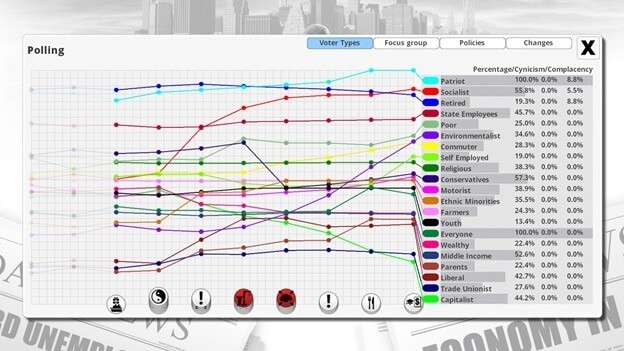
You begin by picking one of six Western democracies to helm. You can fiddle with the term limits and lengths if you don’t like the country’s system, although for some reason even multi-party countries only have a single group in opposition. The game is more about managing the country than getting elected, so perhaps the goal was to keep things simple, but it’s an odd omission in a game that otherwise strives for accuracy. Regardless, once you’ve selected your country and fiddled with a few settings you’re plunked into the seat of power.
“This Is What Democracy Looks Like”
On only the second screen of the game you’ll learn that Democracy 3 is not screwing around.
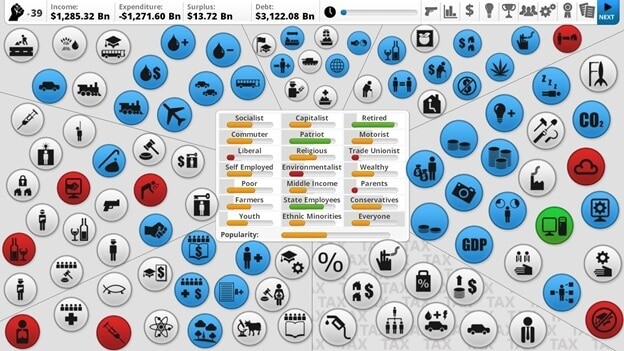
I’ll do my best to explain this UI nightmare. The blue circles are statistics—they give you information on everything from CO2 emissions to how many people drive to work. The white circles represent government policies—handgun laws, inheritance taxes, after school programs… pretty much anything you can think of. Going into one lets you fiddle with it (for example, you could increase funding to a food stamps program, or lower the drinking age from 21 to 18) or cancel it altogether.
Countries start with policies more or less representing what they have in reality today, but from there it’s up to you. The red and green circles represent “situations,” or the effects of your policies— a drug addiction epidemic, a technological boom, etc. Working to eliminate red ones and create green ones will be one of your main goals.
All the icons are split into six quadrants representing aspects of government—law and order, social policy, tax, and so on. If you can think of something a government does, measures or causes, you’ll probably find it here.
If it looks confusing, that’s because it is; none of the icons are labelled, leaving you to guess at what they represent. Hovering over an icon does tell you what it is… but it also hides the rest of the screen.
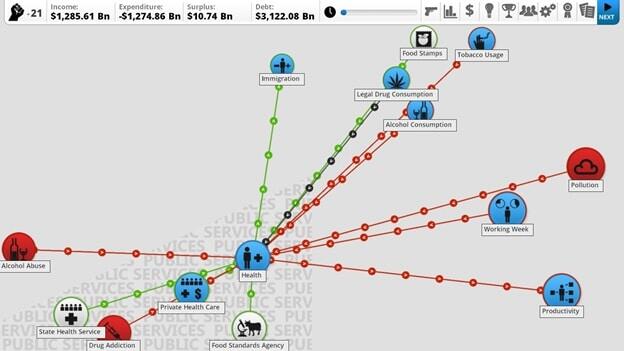
The layout is stylish, but largely useless. I did stumble across a more intuitive way to view policies and statistics, but they were hidden in menus that the barebones tutorial didn’t show me. As for the situation icons, I was unable to find a way to view a nice, simple summary of them.
The UI has other issues, too—Xing out of a screen sometimes takes you back further than you’d like to go and, more bizarrely, it counts as a confirmation. The idea of an X meaning cancel is fundamentally ingrained in computer users, but in Democracy 3 (or D3mocracy, as I’m tempted to call it) if you want to undo a potential change you have to hit the “Revert Changes” button and then cancel out. It’s tedious and leads to annoying mistakes.
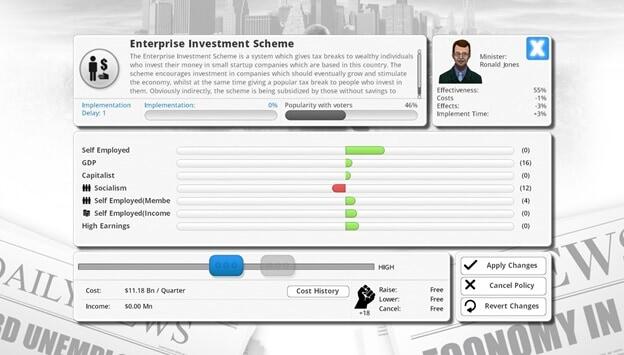
Other issues are minor, but bizarre. The options menu doesn’t save your preferences, forcing you to change them every time you fire up the game. Between the repetitive, vaguely ominous soundtrack and the irritating, omnipresent sound effects you’ll want to kill the volume, and having to do it every session is an annoyance.
Democracy 3 is a classic example of a game putting style before substance. To be fair, it’s not a huge problem; once you’ve invested a little time in the game you’ll get used to the UI’s quirks. But the game makes a bad first impression, and we all know that no politician wants to do that.
“Democracy is a charming form of government, full of variety and disorder, and dispensing a sort of equality to equals and unequal alike.”
Okay, enough about the interface. Let’s get into the nitty-gritty details of running your country…
You begin as a freshly-elected President, or Prime Minister, or whatever it is Australia has (Kangaroo Kings, I think). With every turn you’re allotted political capital, which you spend to create, adjust or cancel new policies, or shuffle your cabinet. Your goal is to use policy to shape the country as you see fit — whether that’s creating jobs or taking away everyone’s freedoms is up to you. Just remember that you need to remain popular enough to win an election.
The majority of your time will be spent crunching numbers to make cost-benefit analyses. Every action will satisfy some demographics while angering others, and they’ll also sway your country’s statistics.
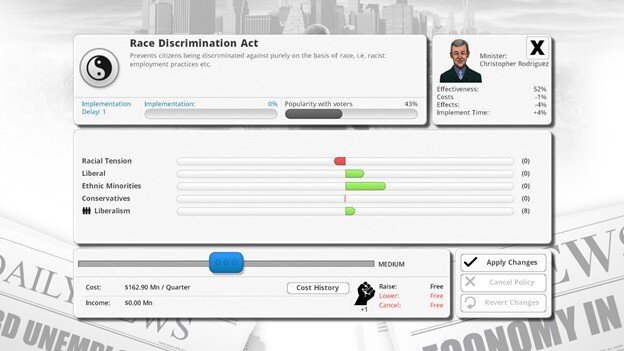
Unfortunately, it’s not just a simple matter of giving the people what they want; every voter in the country hates taxes, but you’ve got to implement them if you want to afford the policies they do like. And no matter what you do, you’re going to piss some people off. Anyone who’s ever watched more than five minutes of CNN knows that.
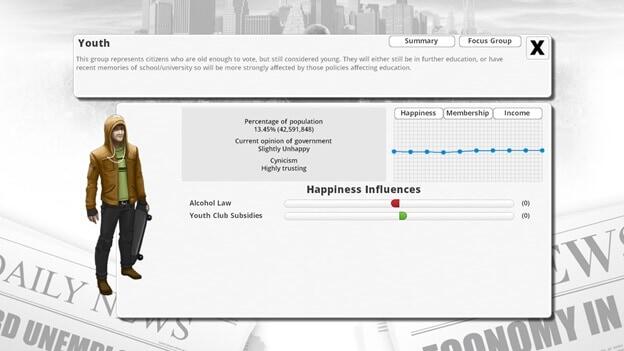
Your policy goals are really up to you. You can be a pragmatist and try to keep everyone somewhat happy, or you can let your personal beliefs take over and shape the utopia the insert group that disagrees with you here are too dumb to appreciate.
A smattering of achievements are the only real targets the game itself offers you. In my first term as President of America I focused on social reform. I was successful, at the tiny cost of sending the GDP into a death spiral.
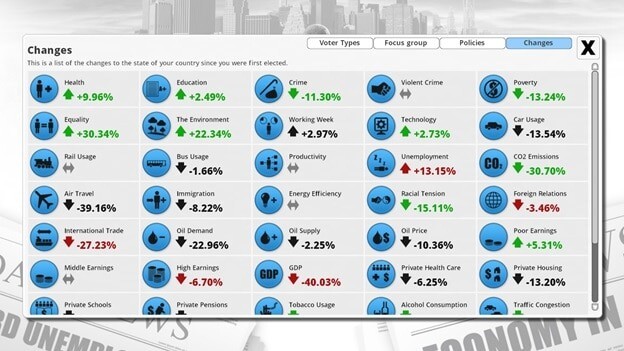
Most turns also present unexpected challenges: You might be asked to deal with the aftermath of a hurricane, or make a ruling on software patent laws; you might get a boost in the polls by capturing a wanted terrorist, or see your economy suffer thanks to an attack on another country`s oil reserves.
Each turn begins with a briefing on the issues your state faces, including what terrorist groups of the day are most likely to try and assassinate you. Hey, being the President is a tough job.
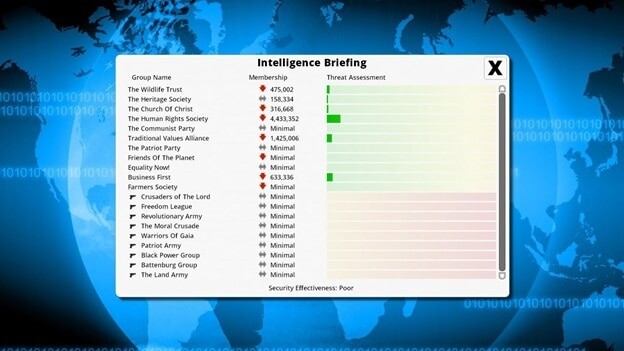
“No man who ever held the office of president would congratulate a friend on obtaining it.”
For those of you who dream of building the perfect society, keep dreaming. Democracy 3 is a challenging sim that strives for realism, and that means you’ll often find your ambitions frustrated. Whether it’s an electorate too stupid to understand what’s good for them or an international economic collapse you had no control over, your best-laid plans will fall apart before your eyes.
In perhaps the game’s greatest accomplishment you’ll be forced to challenge the validity of your own beliefs, as too much single-mindedness can lead to ruin.

You’re given some tools to judge how decisions will play out, like an electorate summary that lets you view focus groups of various demographics. But Democracy 3 is mostly played on the grand scale, where your fellow countrymen are just so many numbers.
As a result, the whole experience is a little impersonal; with no fanfare to any of your decisions, it sometimes feels like you’re an underpaid temp fiddling with Excel charts instead of a leader of the free world.
It’s satisfying to watch your country improve, but ultimately you’re just watching numbers become different numbers. Democracy 3 would benefit greatly from the sense of humor seen in simulation games like Sim City and Tropico. Without it, the game feels sterile.

In your first couple of games, you’ll probably be closer to James Buchanan than Abe Lincoln, but once you get a handle on the ins and outs of Democracy 3’s many interconnected parts, you’ll become a competent legislator. Unfortunately, by that time, the game starts to get a mite repetitive.
There are ways to keep yourself amused though — you can shoot for some of the challenging achievements, or see how extreme a leader you can become before an upset citizen puts a bullet through your head.
Turn America into a hippy, environment-loving commune, or Canada into a repressive police state. There’s fun to be had here, but it’s the lack of scenarios that forces you to think up most of it yourself.
It would have been nice to have seen countries at different periods in their history, or alternate realities, or anything beyond the same six nations over and over again.
“Democracy is the worst form of government, except for all those other forms that have been tried from time to time.”
Democracy 3’s obscure subject matter makes it difficult to give it a traditional score. Even if it was perfectly fine-tuned it would bore the majority of gamers to tears, while the select few political junkie gamers out there will be willing to overlook many a flaw to get their fix.
And flaws are something Democracy 3 has, though in spite of them I was able to lose myself in decision after decision and fall into the old “just one more turn” trap.
It’s just that – even in the greatest depths of my addiction – I couldn’t help but wonder what the point of it all was; the game is more clever than fun – a simulator obsessed with statistics that forgets there’s a human being controlling it.
I still enjoyed the game, and if you’re the sort to get lost in political analysis, then I promise that you will, too. But no matter how much you love crunching numbers, you’ll leave Democracy 3 wishing that the affairs of the people had a little more personality.
[xrr rating=”3.5/5″]
Watch the official trailer for Democracy 3:


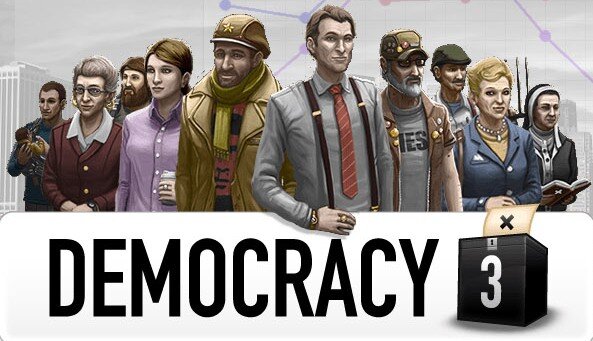



Hey man I liked the review. Good writing